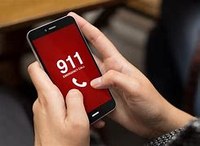Are You Ready to Call 9-1-1?
"Bob" was incredibly sure-footed... until he wasn't. On a recent hike Bob tripped on the trail, fell, and cracked his head on a rock. Your first-aid focal point reports Bob is bleeding profusely and is non-responsive.
Are you ready to call 9-1-1?
Although rare, accidents do happen on CMC trips. When they do happen, it can be a stressful time for the trip leader and participants. One way to reduce the stress is to be prepared ahead of time. We normally think of this primarily as first aid, but being prepared to call 9-1-1 before you have to place the call is also important.
According to 9-1-1 authorities, the most important thing you need to provide is your exact location. In an urban setting the 9-1-1 operator may be able to obtain your location automatically. However, in the backcountry, you may only be hitting one cell tower with a weak signal, so the 9-1-1 operator may be depending on you to provide your location. This needs to be more than "I'm on the X Trail or on Y Ridge", you need to provide your exact coordinates. Fortunately, all of the popular navigation apps (AllTrails, CalTopo, Gaia, OnxBackcountry, etc.) will give you the coordinates for your current location and the ability to copy/paste them into a text. iPhones also provide your coordinates on the compass app. Just be sure that location services in SETTINGS is ON and that you know how to obtain your coordinates before starting an outing; don't try to learn it when the stressful situation is already happening.
It helps to compose a short script for yourself as to what you will say before calling 9-1-1. Passing critical information at the beginning of a call is crucial, because if the signal is lost then 9-1-1 has the initial information on a recording which automatically starts as soon as the 9-1-1 operator answers. A sample script should answer the three W's - WHO, WHERE and WHAT, it might look like the following: "This is (your name), I am at (coordinates, read them the way they are displayed to include the minus sign in front of the longitude), I have (describe the incident - a hiker with a head injury and is non-responsive." The 9-1-1 operator will follow up with questions, but you've already passed the most important part.
One thing to keep in mind is that you may call 9-1-1 proactively, even if you are not sure that you will need assistance. Allowing 9-1-1 to make a heads-up call to the local search and rescue (SAR) team and other rescue resources is a good thing, they prefer knowing at 2pm that they may be going on a mission instead of getting a call-out in the evening with no warning. Do not call the local SAR team or other organizations directly, let 9-1-1 do that since they are the initial focal point for any rescue.
Most of the 9-1-1 centers in Colorado also have text capability, so you may be able to text your information if a voice call won't go through, because a text requires less bandwidth than voice. If you do attempt to send a text, do not send anything other than a simple text message. The 9-1-1 system will not accept a GiF, a map generated by Google, or an audio file.
Interested in learning more about managing incidents in the backcountry? The CMC has a Backcountry Incident Management School which offers several courses a year.
See this link: (Backcountry Incident Management School) for more information. Please enroll even if the course is full, as stand-by lists often clear before the actual class date.
Keith Stinebaugh is a Senior Instructor in the Backcountry Incident Management School
 keith stinebaugh
keith stinebaugh
 Keith Stinebaugh
Keith Stinebaugh

Add a comment
Log in to add comments.Keith and the BIM instructor team do a great job of going through a scenario of calling 911 and sending location as part of the BIM (Backcountry Incident Management) course. I highly leaders take this one day course. Dimitri Poppeliers, chair, NoCo Group
Very clear and helpful!